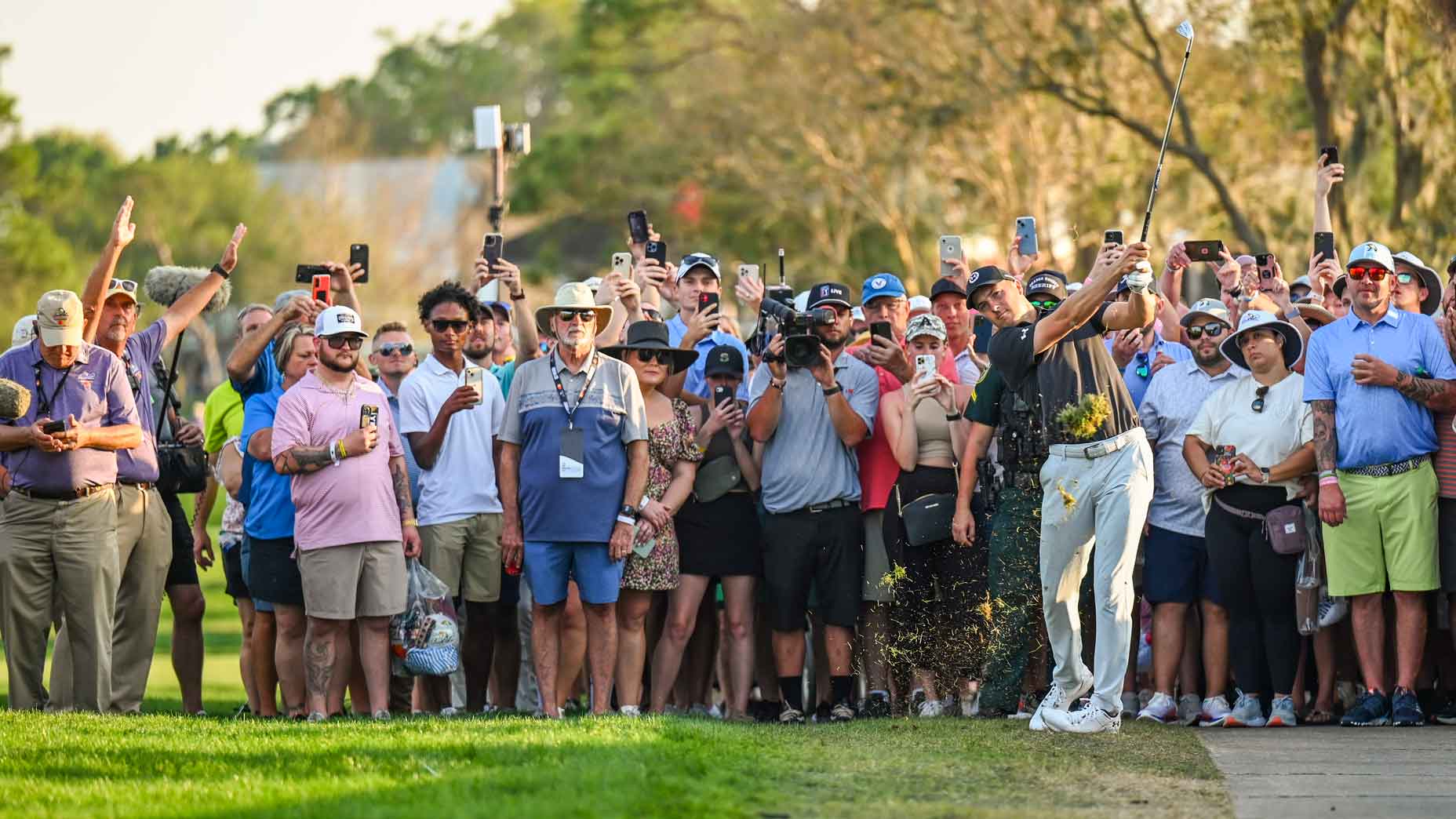A drop-kicked, snap-hooked drive that traveled less than 200 yards and, according to an observer, got no more than 30 feet off the ground.
And a fence.
And a cart path.
And a left-handed stance.
And a rules official.
And a ruling.
And a hands-on-your-knees miss.
And Jordan Spieth, but, at this point in the story, you probably knew that.
In the end, the devil-may-care Texan bogeyed the par-4 finisher at twilight at Bay Hill, he signed for a three-under 69 during Friday’s second round at the Arnold Palmer Invitational, and he’ll start Saturday two shots out of the lead. But saying Spieth made a five on 18 is akin to saying golf is played with a stick and a ball: You’re not wrong, but there’s more to it than that. Let’s go in order. There’s a lot.
There was that drive.
The play, Spieth explained, had been to “hit a low one that held the wind that didn’t get up in the air much.” Fancy. But instead? “I drop-kicked it, which I don’t think I’ve ever done on Tour,” Spieth said afterward. “So, yeah, like I said, I’ve hit a lot of good tee balls. That one wasn’t one of ’em.”
There was that fence. Spieth’s ball ended up against it, after it frisbee’d 199 yards, low and left. (To note, he averages just over 300 yards off the tee.) There was that cart path, too. It was just a couple feet to the right of the ball. And that brings us to the left-handed stance, the rules official and the ruling.
Since the fence was a boundary, Spieth couldn’t get relief, and the only swing the right-handed player had was a lefty one. But to do so would put his feet on the cart path — which allowed him to drop to the right of it and go back to his normal swing. Yes, this was a break. Yes, this is also a little confusing, and Spieth walked through it all with rules official John Mutch.
So … can you change your stance in order to take relief, like Spieth did? You bet, and in the rules book, it’s covered under Rule 16.1a(3), which notes that you don’t get free relief for a clearly unreasonable way to play a stroke, and addressed in Interpretation 16.1a(3)/1. Rather conveniently, your GOLF.com covered this last year, in an installment of Rules Guy, and Mr. Guy explained it well when he wrote:
“The question is, how would the player play the stroke if the cart path weren’t there. If the left-handed stroke is reasonable under the circumstances, then you can take free relief for that stroke. Once you’ve done so, you’re in a new situation and can play the stroke in whatever manner you see fit.”
How did Spieth see it? Notably, in an interview with reporters, he said he was surprised the fence was so close to the path; of course, a player would get relief then. Here’s what he told Damon Hack on Golf Channel:
“There’s that little space in between the cart path and the out of bounds so I had no stance to hit it right-handed, but I had enough room to hit a shot left-handed to punch it up the path up the rough. That would have been a better shot than taking an unplayable so that’s what I would have done. And given that, I was standing on the cart path so I took left-handed relief on the other side, and then from there, I’m allowed to play it any which I want to.
“I just asked a lot of questions. And try to do what he’s telling me to do based on me telling him what I’m trying to do.”
From there, Spieth worked an iron out to about 80 yards short of the hole, and he hit his third shot to 18 feet left of the hole.
And there was that hands-on-your-knees miss.
Because golf. You’d think after the drop-kicked, snap-hooked drive, and the fence, and the cart path, and the left-handed stance, and the rules official, and the ruling, Spieth would get a par. Instead his ball kissed the right side of the cup and slid slightly past. Bogey.
“How does that miss?” analyst Smylie Kaufman said on the Golf Channel broadcast.
“That looked good the entire way,” announcer Dan Hicks said.
“Did everything but fall,” analyst Paul Azinger said.
Indeed.
